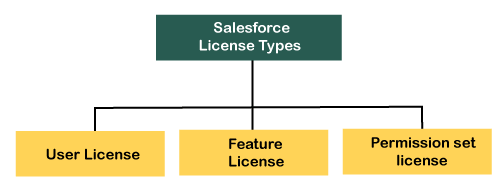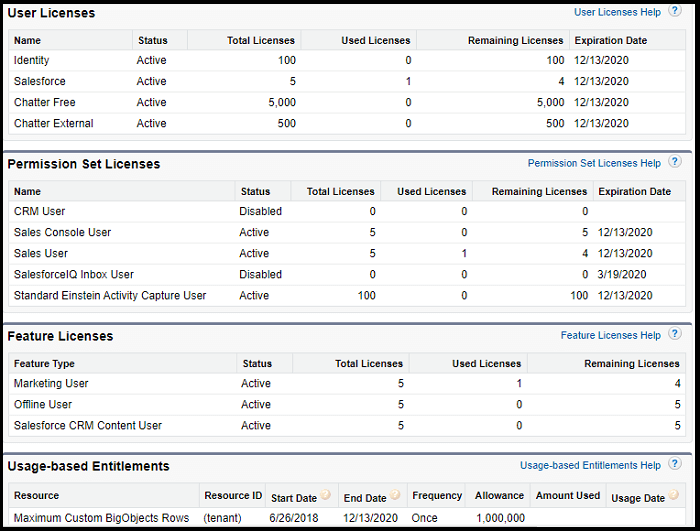Salesforce LicensesIn the previous topic, we have learned about the different Salesforce editions and their features. With each edition, different licenses are associated, which provide access to specific features and functionalities of Salesforce platform to the users. It means the user license provided by the salesforce specifies the functionality that a particular user can access. The licenses are available for an org and can be checked on the company information page. The licenses can be understood by an example, such as if we want to access or check the contracts, we must need the Read Permission for that contract, and this permission is included in the user license. Multiple licenses can support single permission. Each salesforce user should have one user license to access the specific functionality. To access more functionalities, one can choose the permission set license and feature license. For the organizations, the user-based entitlements are also available for purchase. Salesforce License TypesSalesforce mainly provides the below three types of Licenses: 
1. User License: The user license specifies which feature or functionality a user can access on salesforce. Each user must have one license. The users are assigned for the data access through their user-profile and optionally using one or more permission sets. 2. Feature License The feature license authorizes the users to access additional features available in the salesforce that are not included in their user license, e.g., Marketing or WDC. A user can have any number of feature licenses. 3. Permission Set License Like the feature license, the permission set license authorizes the users to access those features that are not included in their user-license. It is a convenient way to assign the permissions to use various tools and functions available on the platform. Below are some actions that can be performed using the permission set license:
How to check for the license type?We can check the license available for the company and can purchase an additional license. To check it, we need to follow the below path on salesforce: It looks like the below image: 
The licenses differ as per the editions. Here we will discuss the different types of Salesforce User Licenses. Different Salesforce User LicencesThe salesforce User-licences are divided into different types, which are given below:
1. SalesforceThe Salesforce license type is the Standard user license designed for the users who need complete access to the standard CRM and Salesforce AppExchange applications. The users with this license can access any standard or custom application. This is one of the most commonly purchased licenses. This is available in all the salesforce editions. 2. Salesforce PlatformThis license type is for those users who only want to have access to custom or AppExchange App without the standard CRM functionalities. With the license, the users can access the core platform functionalities, e.g., accounts, contacts, dashboards, reports, and documents. Users can also access the custom apps deployed in the organization or installed from Salesforce AppExchange. It does not provide access to opportunity or sales forecasts. It also not authorizes some permissions and standard apps, that also includes the standard tabs and objects. Users with this license are allowed to access the apps offline. This license is available in Enterprise, Unlimited, Performance, and Developer Editions. 3. Lightning Platform- Force.com-One AppThe lightning platform is designed for those users who require to access one custom app but don't need the standard CRM functionality. It provides the same features authorization as the salesforce platform user, but additionally, they have access to an unlimited number of custom tabs. The users with this license can only access the one custom app specified upto ten custom objects. It also has a limitation of read-only access to the contacts and accounts objects. The license is available for the Enterprise and Unlimited Editions. The users with lightning platform license can only check or view the dashboard if the running User also contains the same license, and cannot edit or create new dashboards. Note: The lighting platform license is not available for the new users.4. Com-Free AppThe force.com-free App license is available for users who only require single custom applications without standard CRM functionality. It contains the same features as Force.com-One app except for the access of accounts and Contacts. 5. Knowledge only UserAs its name suggests, the license is designed for the User who only requires access to the salesforce knowledge app. This license includes authorization of different tabs, such as Articles, Article Management, Home, Reports, Chatter, Files, Profile, Custom objects, and custom tabs. It also includes the knowledge only profiles that provide access to the Article Tabs using the "View Article" user permission. The user profiles should have "Manage Articles" permission to view and User the Article Management Tab. The license is available in the Enterprise, Unlimited, and Performance editions. 6. Content Only UserThe content-only user license is available for the users who want to access the salesforce CRM Content only. It also includes the access of the below tabs:
7. Guest UserThe Guest user license is designed for the public users who want to access the force.com site or Salesforce Sites. These public users can also access the public pages in the communities if the Communities option is enabled. The visitors can view the information that is available on the active public site. For each guest user, one can create one site for the organization. The license is available for the Developer, Enterprise, Unlimited, and Performance Editions. The additional guest user license cannot be purchased for the Salesforce Sites. 8. Customer Portal Manager StandardThe customer portal manager standard is designed for the contacts who want to view or access the customer support information by logging to the Customer Portal. The contacts users can have access to view and edit the data owned by them or other users in the Customer Portal role hierarchy. It also provides access to the users to edit and view the cases in which they are involved. Users can also access the custom objects according to their profile and get the "Portal Superuser" permission. 9. Customer Portal Manager CustomThe customer Portal manager custom is an advanced version of the customer portal manager standard. It allows the users to run reports according to their profile and receive the "Delegated Portal User Administration" Permission. The partner users can have the below two user licenses to authorize them for the additional features:
10. High Volume Customer Portal UserThe high-volume customer portal user is designed for the users who want to access the Org's customer support information. The users with this license don't have roles, don't appear in the role hierarchy, and can only access particular records as per the specific criteria. These users can also have access of below features according to their profile settings:
11. Chatter Only LicenseThe chatter only user license is also termed as Chatter plus license. This license is designed for those users who want access to chatter with some additional Salesforce objects but don't have a salesforce license. It is available only for the existing chatter plus users. The User with this license can be chatter moderates, including the accessibility of Standard Chatter people, profiles groups, and files pages. The users are authorized for the below access:
The existing chatter plus Customer can purchase more chatter plus license or upgrade to the lightning platform starter. 12. Chatter Free LicenseThe chatter-free license is designed for those users who want to access chatter only without having the Salesforce license. The users can access the standard chatter features such as profiles, groups, and files. The users are not allowed to access any salesforce object or data. The chatter-free users cannot see the salesforce tabs like other salesforce users. 13. Chatter ExternalThe chatter external license is for users who are outside of the company's email domain. Chatter external users can be known as customers. The users can access the group's information in which they are invited and can also interact with other users within the group.
Next TopicSalesforce Sales Cloud
|
 For Videos Join Our Youtube Channel: Join Now
For Videos Join Our Youtube Channel: Join Now
Feedback
- Send your Feedback to [email protected]
Help Others, Please Share









